Labs and Facilities
Fully-equipped. State-of-the-art.
Energy Harvesting System Design Research Centre
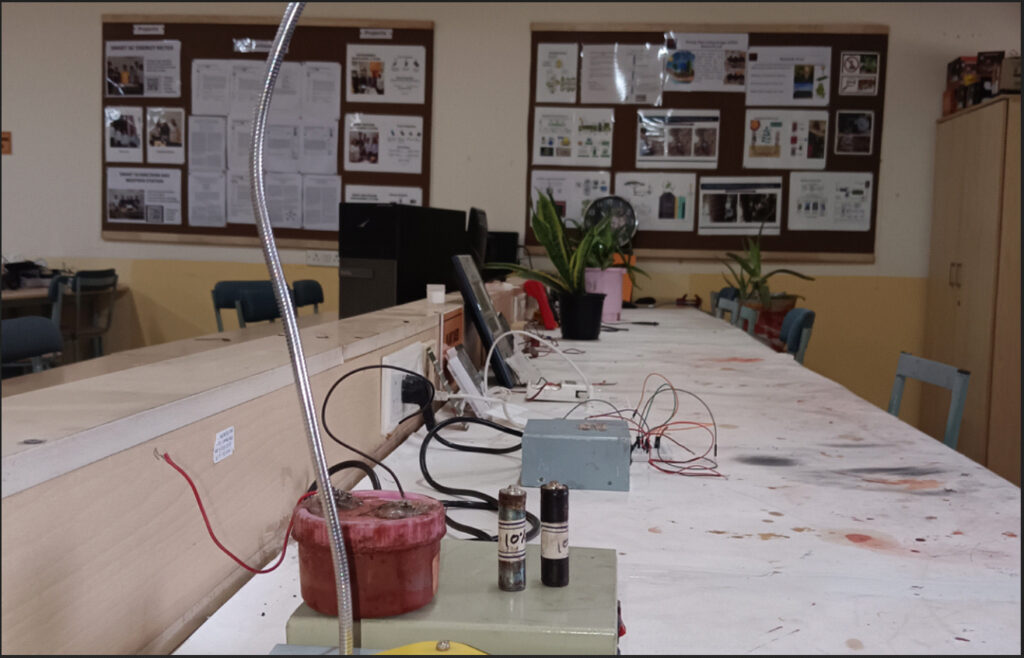
In a world where energy consumption is escalating at an alarming rate, the quest for sustainable and renewable energy sources has never been more critical. Energy harvesting emerges as a promising solution, offering the potential to harness ambient energy from the environment and convert it into usable power. The Energy Harvesting System Design (EHSD) Research Centre at NIIT University aims to develop new technologies that capture and convert energy from various renewable sources to power electronic gadgets.
Energy harvesting is the process of converting energy from renewable sources into usable electrical energy, known as clean energy or green energy, to power various electronic devices and gadgets to replace the hazardous battery in future. The choice of energy harvesting source depends on the specific application and the environment in which the device is used. This energy can be sourced from various renewable sources such as solar radiation, vibration, thermal gradients, wind, radiofrequency (RF) signals and living plants.
EHSD Research Lab has been working on developing new techniques to capture electrical energy from living plants and tress apart from sunlight or wind. The photosynthesis activity in trees and plant can be converted into usable electrical energy to power sensors autonomously with extended lifespans while reducing reliance on traditional power sources and minimizing environmental impact.
Computer Science & Engineering (CSE)
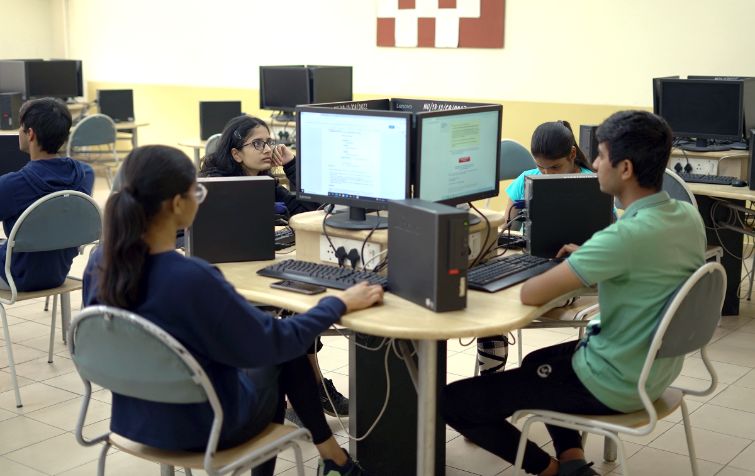
The IT and Software Engineering Labs are on NIIT’s Imperia network and equipped with the synchronous learning technique through which our students are exposed to a real-time learning environment. It gives a fantastic opportunity for industry and academia experts to interact online, thus reducing the constraints of time and space.
The entire computing infrastructure is connected by a high-speed network. Not only that, the entire campus, including the hostel rooms and faculty residences are connected to the campus-wide, wireless network with high-speed internet access for use by faculty members and students.
NU CSE students can confidently use JAVA, R, Python, MATLAB, and different simulators, Windows and Linux Operating Systems, ORACLE database, NoSQL databases like MongoDB, Neo4j, Cassandra, etc., for their Lab work. In the CSE Capstone project lab, students use DevOps Tools, Git & GitHub, MAVEN, JENKINS, Docker, Angular, API-Microservices and other CI/CD tools for their assigned project work.
Biotechnology (BT)

The BT lab contains all facilities pertaining to experiments pertaining to this domain. Apart from labs where practical classes and routine research work is carried out, a separate cold room is available for storing microbial cultures. The cold room houses equipment such as fast performance liquid chromatography (FPLC) for protein purification. Shakers and BOD incubators (New Brunswick) are housed in common laboratories. Besides, students can use a constant temperature room (maintained at 37°C) housed with shakers (Kuhner) to incubate a large number of variable volume flasks.
Biotechnology Lab
There are seven compound microscopes with high magnification zoom lenses available in the lab for visualisation of microbes. Refrigerated and table-top centrifuges available in the lab are used by the students for the harvesting of cells during the experiments. Circulating and temperature-controlled water-baths present are used for controlled experiments. Electrophoresis instruments are available in the lab which helps to run the DNA and Protein molecules for their qualitative and quantitative analysis.
Research Lab in BT
The lab also has a dark room with a Gel documentation instrument, used for visualisation of DNA and Protein molecules after electrophoresis. There are two well-equipped Fermenters of 5 and 7 L capacity used for large-scale operations. The lab also has sophisticated instruments like Electroporator, Gradient PCR, Real-Time PCR, Differential gradient gel, electrophoresis, Inverted microscope, and 2 variable scanning spectrophotometers.
There is a separate room used for the Mammalian cell culture facility, with laminar airflow and a CO2 incubator. Instruments like Ultra sonicator helps in the processing of various cells and the products isolated can be dried in a temperature- controlled Lyophilizer. The shaking incubator with lighting is available for the growth of any photosynthetic organisms. The deionised water required for various lab experiments is supplied by the MiliQ system present in the lab.
Instrumentation Room
Students are trained to operate this equipment. They can carry out metal analysis from any sample — biological or chemical, in the Atomic Absorption Spectroscopy (Spectrachrom). Volatile compounds like alcohol produced by yeast cells in a culture media can be estimated by the Gas Chromatography system (Perkin Elmer). FID or ECD detectors enable the flawless detection of the presence of organic compounds including hydrocarbons and volatile organic compounds.
Constant Temperature Room
Cold Room
Distillation & Autoclaving Room
Physics
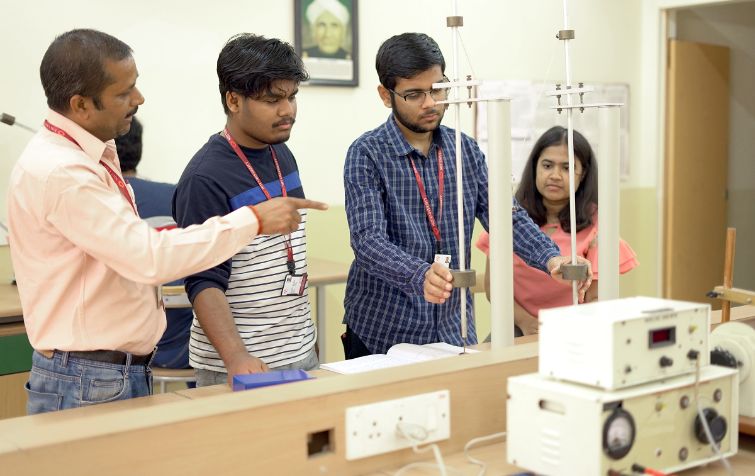
- The Measurement of Magnetic Susceptibility
- Hall Effect
- Ultrasonic Diffraction
- Brewster’s Angle
- Single and Double Slit Diffraction Study using He-Ne Laser
- Normal Modes of a Coupled Pendulum
- Electromagnetic Induction
- Newton’s Rings
- Diffraction Grating
- Polarimeter
- Melde’s Experiment
- Diffraction Grating
Chemistry

- Titration- Acid-base/ Oxidation-reduction (redox)
- Functional group determination
- Adulteration in food articles
- Synthesis of organic and inorganic compounds
- Quantitative estimations of metals
- Viscosity/surface tension determination
- Chemical kinetics
- Melting and boiling point determination
- pH measurement
- Chromatography
- Polarimetry experiments – Specific rotation
- High Pressure reaction
Educational Technology (ET)
NU keeps the focus on learning and teaching with technology as the means and not the mission, through interactions and experiments. NU examines cutting-edge technologies that bridge distance and time, highlight the research behind them and the design that goes into their making — while continuing to focus on the cognitive, affective and social dimensions of learning. Major pedagogical and andragogical paradigms (including some which were invented at the university’s research centre) and their connections with technology are explored in-depth. On the job they help create meaningful and interactive educational products and content for a variety of media such as web, TV, PDAs, etc.
Cyber Security
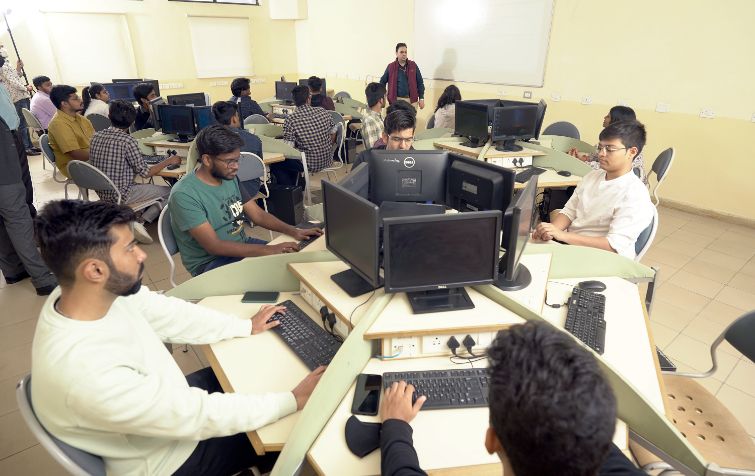
The systems are preconfigured with a list of tools like:
- Cisco Packet Tracer: To understand the working process of the devices and network topology
- Oracle Virtual Box: To create a virtual environment for the practical
- Nmap/Zenmap: Perform network scanning by CLI and GUI
- Wireshark: For the packets capturing and analysing
- Hping3: Packet crafting and arbitrary packet body and size
- Google Hacking: Use google hacking technique to gather the information
- Metasploit Framework: To exploit modules and used for penetration testing
- Acunetix: To find web vulnerabilities
- Nikto: For web server vulnerability scanning
- Netsparker: Demonstrate web application security needs
- Burp Suite: For Web application security
- SQLMAP: To find the SQL injection flaws
- KFSensor: For honeypot and IDS practice
- Snort: For Network Intrusion Detection System
- VeraCrypt: For disk encryption
- Wapiti: Command-line based vulnerability scanner
- Ettercap: Supports active and passive dissection and includes features for network and host analysis
- Savvius: Checks performance issues and reduces security risk with the deep visibility provided by Omnipeek. It can diagnose network issues faster and better with Savvius packet intelligence
- QualysGuard: Checks the performance vulnerability of cloud systems
- Nessus Professional: Check network vulnerability
- OWASP Zed: Automated scanners, as well as various tools that allow users to discover security vulnerabilities manually
- ProDiscover Forensic: To recover deleted files and access Windows alternate data streams
Along with these NU CSE has dedicated Virtual Labs for the MTech Cyber Security programme. The labs are categorised based on different areas of specialisation of the Cybersecurity master’s programme. A base machine with Ubuntu, 4vCPU 16 GB RAM 100 GB SSD with root access and In VirtualBox installed Kali, Win x, Metasploitable and administrative access is provided to respective Faculty members.
Lab-1 for Infra security and VM: Four cloud labs are configured under following subject areas with 25 individual Virtual Machines for individual students with proper access permission and preinstalled OS and tools:
- Vulnerability Assessment & Penetration Testing Lab
- Advanced Cyber Security Tools for INFRASEC & VM Lab
- Advance Network Security Lab
- Security Analytics Lab with R and RStudio, Python, Sublime text, D3.js, Git, MongoDB, Radis, Mahout on Ubuntu.
- Cyber Security Operations lab
- Advanced cyber security tools for Cyber Defence Operations lab
- IoT Security lab
- Threat Intelligence lab
- Security Analytics lab with R and RStudio, Python, Sublime text, D3.js, Git, MongoDB, Radis, Mahout on Ubuntu.
- Analytics and Big Data lab
- System and Network Security lab
- Platform and Cloud Security lab
- Cryptography lab
Data Science
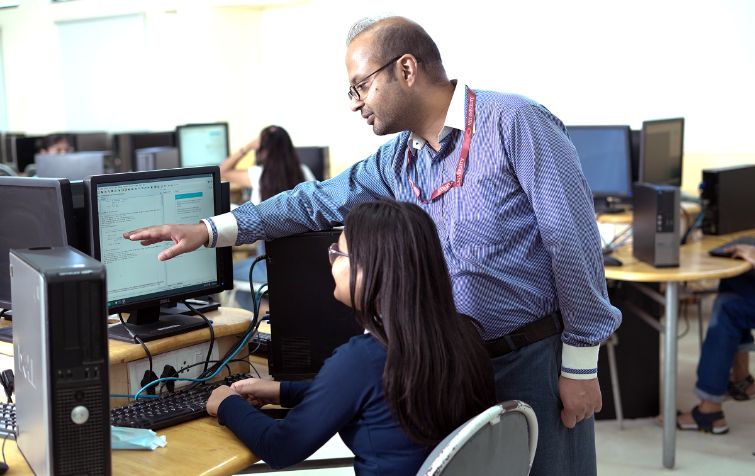
The Data Science Lab and Simulation Lab contains 68 and 32 high specification Lenovo and Dell systems (i7 processor, 16 GB RAM, 1 TB HDD) configured with Windows, Ubuntu operating systems. The entire computing infrastructure is connected by a high-speed network.
NU Data Science students are trained to use JAVA, R, Python, MATLAB, and different simulators, Operating Systems, NoSQL Databases like MongoDB, Neo4j, Cassandra during the course of their lab work.
The Bigdata Lab is enabled with components that collectively form a Hadoop ecosystem for students’ lab assignments, projects and research:
- HDFS: Hadoop Distributed File System
- YARN: Yet Another Resource Negotiator
- MapReduce: Programming based Data Processing
- Spark: In-Memory data processing
- PIG, HIVE: Query based processing of data services
- HBase: NoSQL Database
- Mahout, Spark MLLib: Machine Learning algorithm libraries
- Zookeeper: Managing cluster
- Apache Kafka: for high-performance data pipelines, streaming analytics, data integration, and mission-critical applications.
In the Data Science Capstone project lab, students use DevOps Tools, Git & GitHub, MAVEN, JENKINS, Docker, Angular, API-Microservices and other CI/CD tools. The R&D Project Lab is enabled with Deep Learning, Machine Learning, Lateral Language Processing, Computer Vision, Digital Image Processing, Predictive Modelling and optimisation tools and technologies to do research and development in different Data Science areas.
VLSI Lab
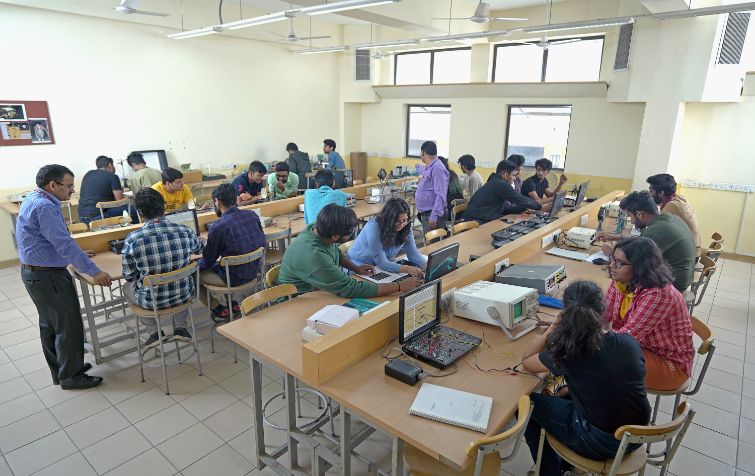
The Advanced VLSI Lab is equipped with 30 PCs and modern FPGA boards for digital IC design and testing. LTSPICE, an open source tool, is used to simulate analog circuits. All PCs are configured with the latest Integrated Development Environment (IDE) for architectural design and testing of ICs.
The lab facilitates low-power, high-frequency and area-optimised architecture design and development. Students and scholars get to work with the latest-in-the-industry tools here.
Digital Signal Processing Lab
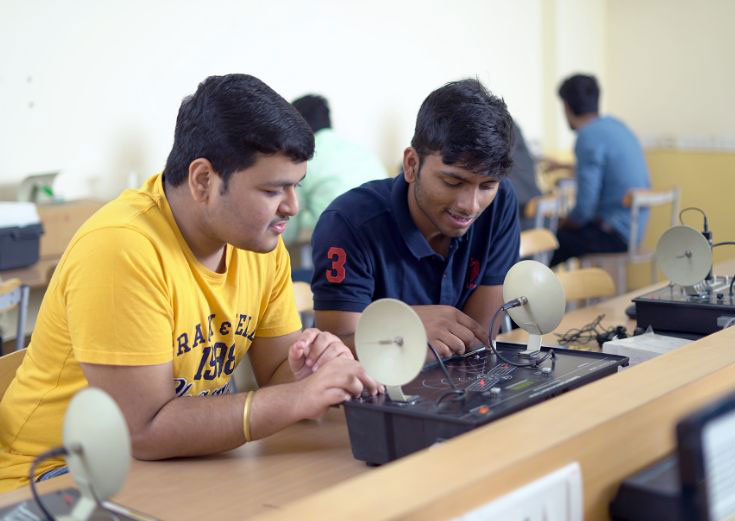
The DSP lab exposes students to various Algorithms and Simulation tools for design and realisation of Digital Filters using FFT. Students are given extensive practice on MATLAB using Signal Processing Toolbox. The lab is equipped with testing and measuring instruments like Digital Storage Oscilloscopes, Function/ Pulse Generators, microphones, headphones and speakers.
Microcontroller and Embedded Systems Lab
The Microcontroller and Embedded Lab contains 20 customised PCs configured with multiple operating systems such as Ubuntu 15, Windows 8, etc. Development environments such as MPLAB IDE, MDK 5 -the KEIL embedded tool for ARM are installed on every system.
The lab also contains customised kits for programming in different microcontroller architectures such as 8051, PIC and high-end processors such as ARM. The lab also has electronic equipment such as Logic Analyzers, Digital Storage, oscilloscope, etc., which are commonly used in Embedded Systems Design & Development.
Antenna and Microwave Propagation Lab
The passive devices include
- Wave guides
- Directional couplers
- E–Plane tee
- H-Plane Tee
- Magic Tee
- Isolator
- Circulator
- Attenuator
- Tunable probe
- Moveable short
- Terminations
- Simple dipole
- Folded dipole
- Yagi-Uda
- Hertz
- Zeppelin
- Log periodic
- Loop
- Rhombus
- Ground plane
- Slot
- Helix
Wireless Communication Lab
The Wireless Communication Lab contains 15 customised PCs configured with multiple operating systems such as Ubuntu 15, Windows 8, etc. MATLAB is installed on every system.
The lab contains tools for wireless networking using protocols such as Bluetooth, ZigBee, 6LoWPAN and BLE to conduct research work. The lab is also equipped with kits to demonstrate CDMA, Digital Modulation Techniques and Spread Spectrum Modulation Technology to students.
NU provides a state-of-the-art Wireless Communication Laboratory facility with cutting edge equipment for students taking the Electronics & Communication Engineering programme. The lab provides a platform for students to explore, study and analyse various advanced wireless communication technology concepts.
The lab is equipped with a high-end Spectrum Analyzer, Digital Storage Oscilloscope, Arbitrary Waveform Generator, DSP board, high gain horn antenna and various types of sensors to help students learn the concepts and scope of futuristic 5G network and its application towards IoT for advanced research.
Electronics Lab
- Cathode Ray Oscilloscopes
- Storage Oscilloscopes
- Function Generators
- Power Supplies
- Multimeters
- Digital Trainers
- Spectrum Analyser
- Mechatronics board with Programmer experimental kits for Analog and Digital Communication and Digital Signal processing
Control Systems Lab
The lab is equipped with a PID controller kit and Compensator kits. It helps the students to implement the control Algorithms and Simulation tools for the design and realisation of the systems. A Control System Toolbox is installed on 15 customised PCs configured with multiple operating systems such as Ubuntu 15, Windows 10. The lab is equipped with signal generators, oscilloscopes (25 MHz, 2 channels), DSO (50 MHz, 1 G Sa/sec) and logic analysers.
Analog Communications Lab
Digital Communications System Lab
The Digital Communications System Lab has been equipped with cutting-edge instruments to perform experiments on various digital modulation techniques and for enabling the understanding of sampling theory. Advanced equipment and high-end system analysers enable the faculty to develop modulation techniques on their own.
Students can develop various digital and pulse modulation techniques and fabricate it at the product level. This lab equips the students to continue their journey towards advanced wireless communication systems and in various research and development work.
Digital Logic and Circuits Lab
- Adder
- Multiplexer
- Encoders
- Decoders
- Flip-flop
- Latches
- Registers
Embedded Systems and VLSI Design Lab
FPGA kits (Spartan 3e and other peripherals) are available for designing the systems. ATMEL based AT89S52 development boards, Microchip based PIC16F877a development boards & ARM based STM32F103RB development boards, logic analyser and Ulink2-Keil ARM JTEG debug adapter are available in the lab. This lab is equipped with 30 high-end computers with updated OS and related software.
Optical Communications Lab
Moreover, the lab has the facility to demonstrate the working of key optoelectronic devices like Light Emitting Diodes, LASERs and Photodiodes and to analyse their performance characteristics. The lab also has a fusion splicer where students can learn to splice the fibres for different optical networking applications.
Satellite Communications lab
Wireless Communication Lab
The lab is equipped with a high-end Spectrum Analyzer, Digital Storage Oscilloscope, Arbitrary Waveform Generator, DSP board, high gain horn antenna and various types of sensors to help students learn the concepts and scope of futuristic 5G network and its application towards IoT for advanced research.
Workshop Practice Lab
There are additional experimental setups related to CNC machining, PCB development, etc., which helps students to enhance their knowledge. Students also get the opportunity to implement their ideas through various application oriented micro projects.
Geographic Information Systems
GIS Lab
NU’s GIS Lab is equipped with the following hardware, software, surveying instrument, and cloud-based platforms:- Hardware:
- High configuration computer workstations for each student equipped with required accessories. The workstations have excellent storage facilities along with high-speed processors.
- The GIS lab offers high end computer systems for the students to work on 3D applications with high quality graphics, 3D mouses and 3D Glass kits.
- ESRI CityEngine Advanced
ArcGIS Desktop Advanced (ArcGIS Pro and ArcMap):- 3D Analyst
- Data Interoperability
- Data Reviewer
- Geostatistical Analyst
- Network Analyst
- Publisher
- Schematics
- Spatial Analyst
- Tracking Analyst
- Workflow Manager
- Software
This plays an important role in building 3D models of buildings, road network and utility services. - QGIS
Open-Source software for primary and advanced 2D mapping. - SNAP
Open-Source software from European Space Agency (ESA) plays an important role in working with Sentinel-1 Synthetic Aperture Radar (SAR) datasets and optical datasets. - Surveying and lab instruments:
NU’s GIS lab contains a series of advanced GPS receiver devices to carry out field surveys. It is also equipped with photogrammetry instruments including Mirror Stereoscope and other instruments. - Cloud Based platforms
- ArcGIS Online Standard and premium applications such as:
- ArcGIS Earth
- Explorer for ArcGIS
- Web Mapping Apps
- Collector for ArcGIS
- Survey123 for ArcGIS
- Operations Dashboard for ArcGIS
- Workforce for ArcGIS
- ArcGIS Maps for Adobe Creative Cloud
- ArcGIS Maps for Office
- Esri Maps for SharePoint
- Web AppBuilder for ArcGIS
- Story Maps and Web App Templates
- AppStudio for ArcGIS Basic
- Business Analyst web and mobile apps
- Community Analyst
- GeoPlanner for ArcGIS
- Insights for ArcGIS
- Google Earth Engine (GEE)
A cloud-based platform where we can access, visualise, analyse and export the Landsat, Sentinel, MODIS satellite datasets, Elevation datasets and many more advanced applications. - Programming languages
Students are trained in the theoretical and practical aspects of Python and JavaScript. Machine learning and Artificial intelligence-based R&D projects using these languages will give students the experience of real-world application of such popular fields.
